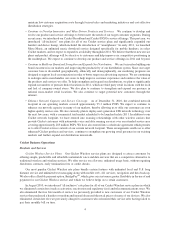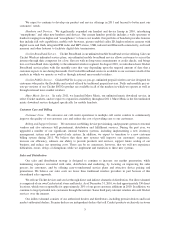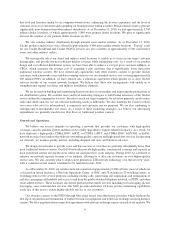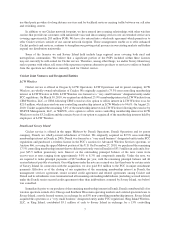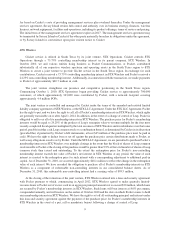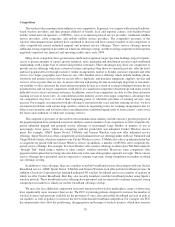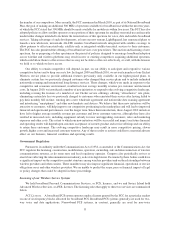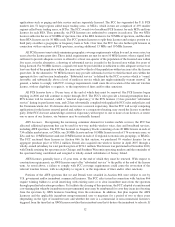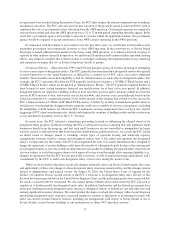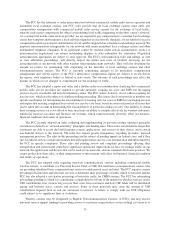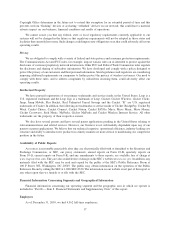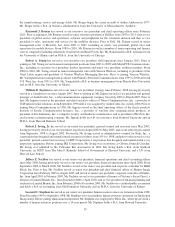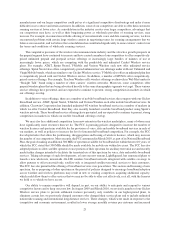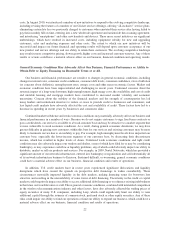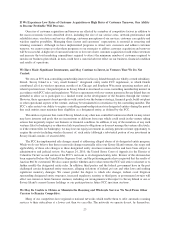Cricket Wireless 2010 Annual Report Download - page 20
Download and view the complete annual report
Please find page 20 of the 2010 Cricket Wireless annual report below. You can navigate through the pages in the report by either clicking on the pages listed below, or by using the keyword search tool below to find specific information within the annual report.Foreign Ownership. Under existing law, no more than 20% of an FCC licensee’s capital stock may be owned,
directly or indirectly, or voted by non-U.S. citizens or their representatives, by a foreign government or its
representatives or by a foreign corporation. If an FCC licensee is controlled by another entity (as is the case with
Leap’s ownership and control of subsidiaries that hold FCC licenses), up to 25% of that entity’s capital stock may be
owned or voted by non-U.S. citizens or their representatives, by a foreign government or its representatives or by a
foreign corporation. Foreign ownership above the 25% holding company level may be allowed if the FCC finds such
higher levels consistent with the public interest. The FCC has ruled that higher levels of foreign ownership, even up
to 100%, are presumptively consistent with the public interest with respect to investors from certain nations. If our
foreign ownership were to exceed the permitted level, the FCC could revoke our wireless licenses, although we
could seek a declaratory ruling from the FCC allowing the foreign ownership or could take other actions to reduce
our foreign ownership percentage in order to avoid the loss of our licenses. We have no knowledge of any present
foreign ownership in violation of these restrictions.
Transfer and Assignment. The Communications Act and FCC rules require the FCC’s prior approval of the
assignment or transfer of control of a commercial wireless license, with limited exceptions. The FCC may prohibit
or impose conditions on assignments and transfers of control of licenses. Non-controlling membership interests in
an entity that holds a wireless license generally may be bought or sold without FCC approval. Although we cannot
assure you that the FCC will approve or act in a timely fashion upon any pending or future requests for approval of
assignment or transfer of control applications that we file, in general we believe the FCC will approve or grant such
requests or applications in due course. Because an FCC license is necessary to lawfully provide wireless service, if
the FCC were to disapprove any such filing, our business plans would be adversely affected.
As of January 1, 2003, the FCC no longer imposes a capped limit on the amount of PCS and other commercial
mobile radio spectrum that an entity may hold in a particular geographic market. The FCC now engages in a
case-by-case review of transactions that involve the consolidation of spectrum licenses or leases and applies a more
flexible spectrum “screen” in examining such transactions.
A C-Block or F-Block PCS license may be transferred to non-designated entities once the licensee has met its
five-year coverage requirement. Such transfers will remain subject to certain costs and reimbursements to the
government of any bidding credits or outstanding principal and interest payments owed to the FCC. AWS licenses
acquired by designated entities in Auction #66 may be transferred to non-designated entities at any time, subject to
certain costs and reimbursements to the government of any bidding credit amounts owed.
FCC Regulation Generally
The FCC has a number of other complex requirements and proceedings that affect our operations and that
could increase our costs or diminish our revenues. For example, the FCC requires wireless carriers to make available
emergency 911, or E911, services, including enhanced E911 services that provide the caller’s telephone number and
detailed location information to emergency responders, as well as a requirement that E911 services be made
available to users with speech or hearing disabilities. Our obligations to implement these services occur on a
market-by-market basis as emergency service providers request the implementation of enhanced E911 services in
their locales. Absent a waiver, a failure to comply with these requirements could subject us to significant penalties.
Furthermore, the FCC has initiated a comprehensive re-examination of E911 location accuracy and reliability
requirements. In connection with this re-examination, the FCC issued an order requiring wireless carriers to satisfy
E911 location and reliability standards at a geographical level defined by the coverage area of a Public Safety
Answering Point (or PSAP) and has indicated that further action may be taken in future proceedings to establish
more stringent, uniform location accuracy requirements across technologies, and to promote continuing
development of technologies that might enable carriers to provide public safety with better information for
locating persons in the event of an emergency. We cannot predict whether or how such actions will affect our
business, financial condition or results of operations.
FCC rules also require that local exchange carriers and most commercial mobile radio service providers,
including providers like Cricket, allow customers to change service providers without changing telephone numbers.
For wireless service providers, this mandate is referred to as wireless local number portability. The FCC also has
adopted rules governing the porting of wireline telephone numbers to wireless carriers.
14


